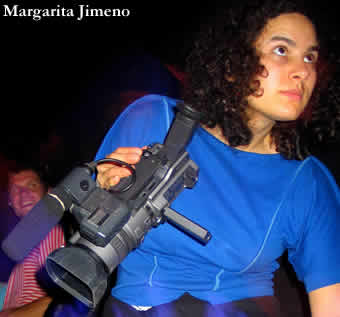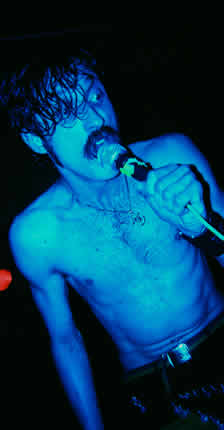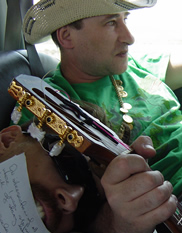From New York City’s sensational Russo-disco scene to a non-stop touring marathon with his band Gogol Bordello, Eugene Hütz takes us deep into his artistic life and influences. The story unfolds over five years, beginning in 2001,
and follows Eugene and Gogol Bordello‘s progress from underground legend to international phenomenon.
Ranging in age from 25 to 50 years old, and hailing from five different countries, Gogol Bordello’s members share their tales of immigration, of how they became part of the band, and how they quit their day jobs to go on tour. Taking pride in his Roma (or Gypsy) background, Hütz not only sings in Romany, he collaborates with and supports New York City’s Roma musicians, such as Yuri Yunakov, and Piroska Racz. And after five years on the road, the band has coalesced into a solid artistic collective, a family.
Through music, the film delivers messages of social and political commentary, and captures Gogol Bordello in the act of performing, whether as headliner or as the spark of incendiary jams with such acts as Manu Chao (a French/Spanish rocker). And with an international tribe of “multi-culti” fan-friend supporters, Gogol Bordello keeps “instigating creative hell and attacking people’s passivity” (Hütz).  “Gogol Bordello Non-Stop” goes beyond music, beyond the political, opening hearts and ears to an artistic revolution in a globalized era.
“Gogol Bordello Non-Stop” goes beyond music, beyond the political, opening hearts and ears to an artistic revolution in a globalized era.
Margarita Jimeno is an emerging director and writer, who brings her unique creative and visual style to all projects ranging from documentaries, short films, music videos and feature films. Jimeno has two fiction scripts right now in revision, “Feminine Technical Difficulties” a tragic comedy set in New York and “Guerrero” an epic drama set in 1980’s Colombia. Born and raised in Bogotá, Colombia, Jimeno moved to New York in 1997 where she continues to live and work.
Began Tehrani: What motivated you to make “Gogol Bordello Non-Stop”? When did you first decide to make this film? Was there any particular reason?
Margarita Jimeno: No, none really. I didn’t really start thinking that I was going to make a film, and I didn’t really plan anything at the beginning. In 2001 I was just out of film school. I was already a regular at the Bulgarian bar so I wanted to do a short video about the party, and Dj Hütz (aka Eugene). So I asked Eugene if I could follow him with my camara, and he said ‘of course, but you know Margarita you have to check my band’. Finally one day I went to see Gogol Bordello, and it was amazing. I started  filming more after that, and I didn’t really have an idea of what I was doing, I didn’t have an agenda. It was just natural to be there following Eugene and the band. After years went by I think he didn’t realize also what he was getting into. I was just basically filming things that I thought could be interesting. So I pretty much treated this not as a video film that you go and film 500 hours of footage and then think about what story you have. Once I saw the story I knew what I wanted to film. And of course when I was doing that something amazing and spontaneous would happen. Like when Eugene goes to the shoemaker store I wasn’t understanding much or any of the conversation to be honest, yet I knew something very spontaneous was taking place, so I was patient and filmed it all. I didn’t just hang around month after month. I was very specific about what I was shooting.
filming more after that, and I didn’t really have an idea of what I was doing, I didn’t have an agenda. It was just natural to be there following Eugene and the band. After years went by I think he didn’t realize also what he was getting into. I was just basically filming things that I thought could be interesting. So I pretty much treated this not as a video film that you go and film 500 hours of footage and then think about what story you have. Once I saw the story I knew what I wanted to film. And of course when I was doing that something amazing and spontaneous would happen. Like when Eugene goes to the shoemaker store I wasn’t understanding much or any of the conversation to be honest, yet I knew something very spontaneous was taking place, so I was patient and filmed it all. I didn’t just hang around month after month. I was very specific about what I was shooting.
BT: Am I correct that making this film took almost seven years?
MJ: Yea. Filming started in 2001, at the Bulgarian bar, that summer Gogol Bordello played with Manu Chao at Central Park. And the after party was at the Bulgarian Bar, that’s the first jam I captured with Manu chao jamming on the street with Eugene in New York. Even the format of the camera there is completely different than what most of the film is done with. I was filming literally until January 2007, which was the last interview I shot. I have been editing on and off since 2006 , but the core was done this past year. So, yea, seven years.
BT: The flow of the music, which always takes you to unexpected moments, did that influence the visual style of your film?
MJ: I didn’t really sit down and analyze the music and how I would edit the film. But there is definitely something in the way I edited and the way I wanted to present the story that may be similar to what Gogol Bordello does. Eugene is a very creative person and I like that kind of creativity, so it might be similar because of that. But I didn’t really sit down and analyze the songs. It is more of an artistic similarity. If you like a certain style of film or music, I think that what you produce will be influenced by these things.
BT: What is also interesting is that this band is an international band. You have origins in another country as well. Was that one of the reasons that made you interested in this band?
MJ: Gogol Bordello has so many layers of interest. For that reason it is easy and accessible for anyone, because it has a social-political view, it has a party atmosphere, a surrealist theatrical show, each person has different music backgrounds, and training, also the generation gap is interesting. In the beginning the live shows had these crazy dance moves and a very theatrical approach, which I was very much into this kind of performance. It can be very surrealist sometimes, like when Pam takes her drum in the crowd. It has many layers that are interesting. That is why I got interested. It is a little bit of hyperactivity in a way, and I guess I am a little bit like that. They have so much stuff going on it is hard to get bored with it, even if you tried. There will always be one thing you will identify with.
BT: We always associate artists from Columbia with magical story telling. I see that in the style of your film. It is like a fairy tale and a documentary. And in a way you find that in the subject as  well, which has a magical touch to it.
well, which has a magical touch to it.
MJ: Yea, completely. Growing up in Colombia there was a daily live of magic realism. Once you move from Colombia you understand the beauty of the daily stories, and how magical they are. I have an interest in seeing those moments. Even though I say I want to film something specific, once I am there, I ’m very open and watching for a beautiful moment, is a sort of subtext, but I take these moments as radical true moments. One of my favorite moments is when Sergei is feeding the pigeons. I thought it was amazing. It just happened and I turned the camera. Those are the moments we should be watching out for.
BT: How do you differ their kind of music from the popular music that is in the U.S. right now? Personally I find that a lot of popular music now only presents certain expectations. There are few new ideas in popular music, especially compared to the kind of music that Eugene and his band present; with them you can see new ideas and freshness.  MJ: Yea. I see what you say. I live in a cave I guess in regards to mainstream media in general. I really don’t pay too much attention, but if I happen to come across some mainstream bombardment I usually turn it off, because I find it has no soul. It feels like it is not sincere, like the music industry might be going through a hard time and they just need to present repetition so they are “safe”. At the same time things that are not safe, if they are amazing, usually make their way out. It just takes longer, Like Gogol Bordello. It took them years to come out.
MJ: Yea. I see what you say. I live in a cave I guess in regards to mainstream media in general. I really don’t pay too much attention, but if I happen to come across some mainstream bombardment I usually turn it off, because I find it has no soul. It feels like it is not sincere, like the music industry might be going through a hard time and they just need to present repetition so they are “safe”. At the same time things that are not safe, if they are amazing, usually make their way out. It just takes longer, Like Gogol Bordello. It took them years to come out.
BT: I see that you are planning for two feature films. One of them is “Feminine Technical Difficulties”. Where are you with these projects?
MJ: “Feminine Technical Difficulties” is a project I started last year. I am still going over the script. Most of my work has to do with music, and this one has a lot of emphasis on the music. It is a fun story, a sort of tragic comedy / thriller musical. The other one, “Guerrero”, I have been working on for years. It is set in Colombia 1980’s. It has a historical background, so over the years I have had to stop and spend some time reading to get the background atmosphere, this story is more epic, but because of its political background, and the process Colombia is going through right now it has been difficult to convince Colombian people about it. Yet I’ve had great response from international producers.
We’ll see what kicks in first.

